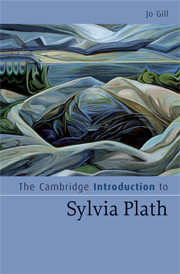Book contents
2 - Contexts
Published online by Cambridge University Press: 05 June 2012
Summary
The literary and historical contexts for Sylvia Plath's writing are surprisingly broad: she straddles a number of different traditions and discourses. Writing in the 1950s, she is partway through the century and thus might be read alongside the so-called ‘middle generation’ of American poets. In her early poetry in particular she employs a number of complex forms (terza rima, rime royale and so on) to considerable effect, thereby demonstrating her debt to an established poetic tradition. But she also coincides with John Berryman, Allen Ginsberg, Robert Lowell and the early Anne Sexton and thus with the ‘breakthrough’ of what became known as the ‘confessional’ mode of poetry. An American by birth, she traces her ancestors back to Germany and Poland and was brought up by parents for whom English was a second language. In terms of literary and linguistic influences, then, she is partway between American and European heritages. Similarly, as an American who moved to England twice, first as a young graduate student then subsequently as an adult woman, a wife and a mother-to-be, Plath embodies transatlantic concerns or, more properly, inhabits, as Tracy Brain proposes, a ‘midatlantic position’ – one which refuses to choose between two places.
Plath is known as a poet but she saw her real vocation at various times as being a writer of prose fiction or as an artist.
- Type
- Chapter
- Information
- The Cambridge Introduction to Sylvia Plath , pp. 14 - 28Publisher: Cambridge University PressPrint publication year: 2008



